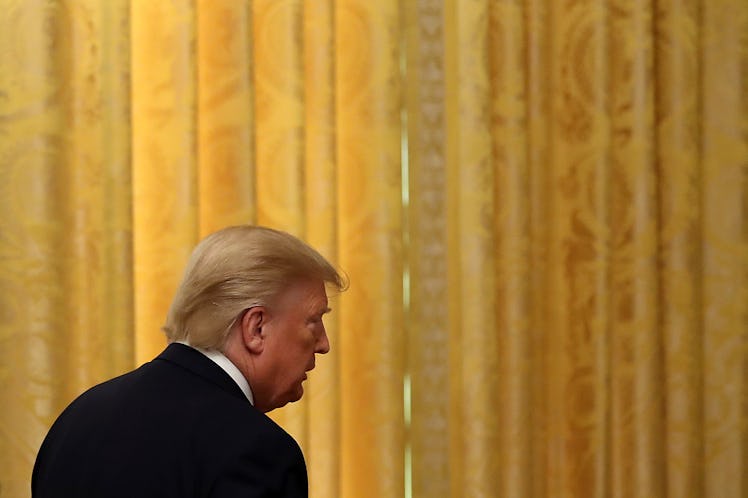
Impeachment Has An Extra Step To Remove A President From Office
Democratic lawmakers are currently investigating President Donald Trump after a whistleblower filed a complaint about his reported interactions with Ukrainian leadership — and Trump is not happy about it. The president has slammed top Democrats, going so far as to accuse the chairman of the House Intelligence Committee for treason, but that hasn't stopped Democratic lawmakers from launching an impeachment inquiry into Trump, which the White House characterized as "weaponize[d] politics" in a statement. But is an impeached president removed from office automatically? Getting a president out of the White House is not that simple.
Even if Congress manages to impeach Trump, that does not mean he would automatically be removed from office. That's because impeachment and removal from office are two separate processes, and require two different votes. The impeachment process comes first, and it's rather extensive. Before anything else can happen, one of the lawmakers in the House needs to introduce articles of impeachment, which need to contain unambiguous evidence that the president committed one or more impeachable offenses. In Trump's case, we don't know yet what the articles of impeachment are, but Democrats will have to decide what aspects of Trump's behavior are the most compelling for an impeachment case.
After articles of impeachment have been introduced — which has happened multiple times throughout Trump's presidency, though unsuccessfully — the Speaker of the House must agree to conduct an impeachment inquiry. After significant resistance over the last several months, House Speaker Nancy Pelosi finally agreed to launch an impeachment inquiry on Sept. 24. In response, White House Press Secretary Stephanie Grisham called the move "nothing new" in a statement to Elite Daily. "Democrats continue to weaponize politics when they should be working on behalf of their constituents," Grisham said.
Now that Pelosi has agreed to an impeachment inquiry, the House Intelligence Committee is currently gathering and examining evidence to determine what impeachable offenses Trump has committed. Then, according to the Associated Press, the House Intelligence Committee will transmit its findings to the House Judiciary Committee, which oversees the impeachment process. The Judiciary Committee will draft a set of impeachment articles, and if committee members vote to approve one or more of these articles, they will be passed along to the rest of the House for a full floor vote.
Here's where things can get a little confusing. According to the Constitution, a president can only be impeached if there is evidence that they committed "high crimes and misdemeanors," such as treason or bribery. So when the full House votes on whether or not to impeach Trump, they will not be voting on the basis of any and all grievances they may have. Instead, they will be voting to impeach Trump on the basis of certain impeachable offenses, as laid out in the articles of impeachment approved by the Judiciary Committee. If more than 50% of the House votes in favor of any of the articles of impeachment, Trump will be impeached. He will not, however, automatically be removed from office.
If Trump is successfully impeached, Democrats are likely to call for his removal from office as a next step. However, removing a president from office is more difficult than impeaching them, and here's why: A simple majority vote in the House is enough to impeach a president, but removal from office requires a formal impeachment trial and a two-thirds majority vote in the Senate. Think of it this way — the House votes to charge the president with impeachment, while the Senate votes to convict the president of impeachable offenses, with the punishment being removal from office.
The Democratic-led House may be able to impeach Trump successfully, but the Republican-led Senate may not be as eager to get him out of the White House. If at least 218 members of the House vote to impeach Trump but less than 67 senators vote to remove him from office, Trump will be able to finish out his term — even after impeachment. He wouldn't be alone if that happens, though. Both Bill Clinton and Andrew Johnson, the only two presidents to be impeached, were permitted to finish serving their presidential terms because the Senate was not able to achieve a two-thirds majority vote to remove them from office.
The impeachment process is long and complex, but it's important not to get ahead of ourselves. For now, Democrats are conducting thorough investigations of the Trump administration to determine what they can and cannot impeach him for. The question of removing him from office won't become relevant until much later, after the full House has taken a vote on the articles of impeachment.